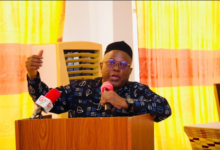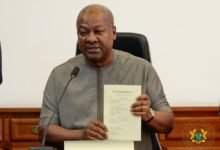
The Development Bank Ghana (DBG), a new Ghanaian bank which aims to support the growth and expansion of small and medium scale enterprises (SMEs) in the country officially opened in Accra yesterday.
The bank started operations with an initial capital of US$800 million and intends to lend money to financial institutions who would, in turn, give out loans to SMEs to develop and expand their operations.
Launching the bank, President Nana Addo Dankwa Akufo-Addo described the event as “a culmination of years of painstaking efforts undertaken by the Akufo-Addogovernment to strengthen the infrastructure for the transformation of the Ghanaian economy for private sector-led growth.”
He said the idea of setting up a Development Bank was announced in the 2017 Budget Statement and Economic Policy when he first assumed office.
“It is one of many policy initiatives that my government has come up with to help transform the Ghanaian economy. The overriding objective is to make long-term funding available to the private sector, and develop the ecosystem for market access, technology and innovation,” he said.
The focus of the bank, the President said, was to help transform the key sectors of the economy over a period of time by supporting the transformation of SMEs.
President Akufo-Addo said since Ghana attained independence, efforts had been made to improve access to finance and markets, with earlier attempts resulting in the creation of the National Investment Bank and the Agricultural Development Bank.
“However, these institutions have not succeeded in delivering on the promise of systematic support for private sector growth,” he added.
“Government put up an initial equity investment of $250 million, the European Investment Bank €170 million, World Bank $225 million, US$40 million grant came from the African Development Bank. The total committed capital to the Bank, both debt and equity, is currently some US$750 million,” he said.
President Akufo-Addo continued, “Undoubtedly, Development Bank Ghana should be the bedrock for our renewed commitment to private sector development. It is expected to work to transform our SMEs into well-functioning, formal and strong corporate with the potential to increase our Gross Domestic Product (GDP), employ more people, and enhance our tax efforts.”
The Minister of Finance, Ken Ofori-Atta, said the DBG was a critical institution to strengthen the country’s financial architecture to support the private sector.
He said the government was committed to ensuring that the private sector got access to long term finance to support their growth and development.
The Minister said the bank would focus predominantly on industrialisation, agriculture, tourism and high value services.
He said the new bank would be run with a strong corporate governance culture and indicated that the bank had been designed to be financially sustainable.
BY KINGSLEY ASARE AND YAW KYEI







